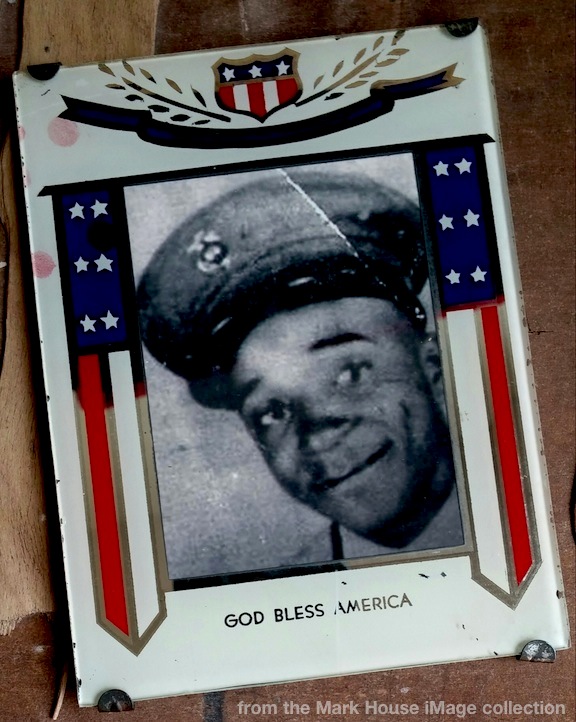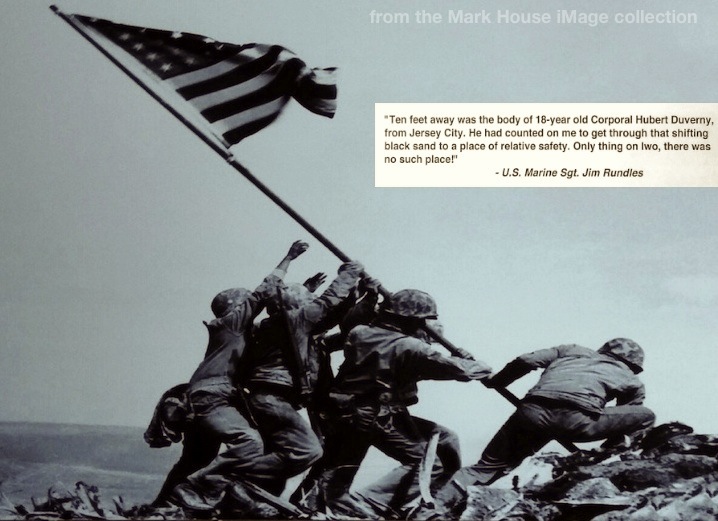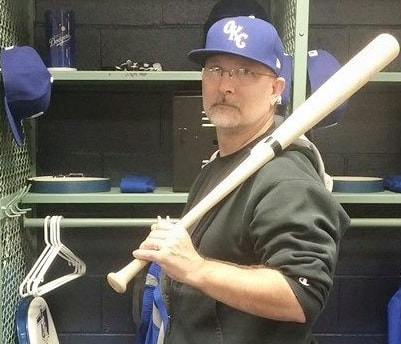copyWrite 2.11.15
Exactly seventy (70) years ago come Monday, February 23, 2015, former U.S. Marine William "Bill" Greason stood on a bloodied Iwo Jima beach with his fellow soldiers and saluted our American flag as it was famously raised over Mount Suribachi. "We saluted that flag both times it went up" says a solemn yet proud World War II veteran and hero. The ninety (90) year old Reverend Greason (aka RG90), from Birmingham, Alabama, remembers that particular day as one of hope within what was considered "hell on earth" by every U.S. and Japanese soldier fighting for possession of such a small but strategic island. Enjoy a look at this flag raising filmed at approximately 10:20 a.m. on February 23, 1945, by Sgt. Bill Genaust as it first flew over Iwo Jima near seventy years ago.
An interesting excerpt from my friend, baseball historian and author Bryan Steverson's book "Amazing Baseball Heroes," describes the Reverend's war experience way better than I can. The following excerpt from Chapter 7 was written near a year before I discovered RG90 taking care of God's business down in Birmingham in late 2011. Chapter 7 itself, is titled From The Sands Of Iwo Jima To The Pitcher's Mound In The Major Leagues.
Steverson writes "On February 19, 1945, thousands of United States Marines stormed ashore on the Japanese island of Iwo Jima. With numerous bunkers and underground caves, the enemy positions were heavily fortified. The Japanese considered Iwo Jima part of their homeland and would defend it to the last man. Over 18,000 soldiers were awaiting the Marines. Of this total only 34 would become prisoners, the rest would either be killed or missing in action. American losses were 6,822 dead and nearly 20,000 wounded. The intense battle to secure the island lasted 35 days. On day five of the battle, the Marines were successful in raising the United States flag on Mount Suribachi, the islands highest point. Over the course of the battle, 27 American servicemen were awarded the Congressional Medal of Honor, our nation's highest award for valor. Four were U.S. Navy sailors and 23 were Marines. The honor given to the Marines would represent 28% of all such awards for valor presented to Marines the entire war. A monument to this heroic effort stands beside the Potamac River in Arlington, Virginia today.
At the beginning of World War II, President Franklin Roosevelt issued an Executive Order declaring men could be inducted into the Marine Corps regardless of race. However, in each branch of service these men would remain segregated until July 26, 1948, when President Harry Truman issued Executive Order 9981 ending such separation. In the battle for Iwo Jima, some 700-900 African Americans would be segregated but have an active role in the invasion. The black Marines involved were not trained with their counterparts. Rather, they received separate training outside Camp Lejune, North Carolina at a location called Montford Point. Although restricted from frontline combat, the black Marines braved enemy fire while loading and unloading ammunition as they moved needed supplies to the front. Like any job on Iwo Jima, it was perilous. Bill Greason was one of these black Marines.
After landing on the island and completing his assignments, Greason was told by his white commander to stay low and dig in. The island was volcanic ash and digging in was not easy. As you dug, the low viscosity ash just seemed to flow right back. If Greason moved, his officer told him he would have him court-martialed for disobeying the order. Greason soon noticed two fellow wounded Marines out front and in need of help. One was a friend from New York. Greason and three others left their secure makeshift hole to help their comrades. Using stretchers, they carried their wounded buddies back to the beach for evacuation. Bill Greason was never court-martialed for disobeying the order. He should have been given a medal. The commander who had given the order was subsequently killed. How could you court-martial a man for bravery? Bill Greason was a hero.
Fleet Admiral Chester Nimitz would respectfully say, 'On Iwo Jima, in the ranks of all the Marines who set foot on that Island, uncommon valor was a common virtue.' Bill Greason was one of many with uncommon valor."
Enjoy a recent conversation with Reverend William "Bill" Greason as he shares about his first hand experience on the island of Iwo Jima.
Of course, as I give thought to the Reverend's honorable salute to our American flag and his WWII service and sacrifice to our country, he will fondly be thinking of several fellow soldiers and friends that died right beside him while on this island regrettably known as "hell on earth." The Reverend often mentions the names Wilkins and Duverny as best friends from his military days. Two best friends that were lost on Iwo Jima. I have learned that Private First Class James Wilkins (in photo below) was K.I.A. on February 25, 1945, and brought back to the states for burial in his hometown of Humboldt, Tennessee.
Sgt. Rundles shared in the Jackson (Mississippi) Advocate "Black marines (the Eighth Ammunition Company) were among the first to go ashore. I led my company, the 34th Marines, ashore and we too had the gruesome task of stepping over piles of dead marines for nearly 50 yards, through that knee deep, black volcanic ash. And when we were off the beach, the Japs turned loose a barrage of mortar fire on us that killed two of my men, and wounded five others. I look down at James Wilkins, a 17-year old lad from Memphis, who wore a tiny American flag in his pocket. He loved his country! Ten feet away was the body of 18-year old Corporal Hubert Duverny, from Jersey City. He had counted on me to get through that shifting black sand to a place of relative safety. Only thing on Iwo, there was no such place!"
I was batboy for the Indians in 1949, when the Dodgers and Jackie Robinson came for an exhibition. I was on the ondeck circle with Jackie five times. That led me to study the history of baseball and black players for years, so I was quite interested in Bill Greason when he came to the Indians. I was working in the press box for the Indians that year as I prepared to go to OU.
It's wonderful to find out what a wonderful man and hero for our country that he was."
Linda Mashburn, Editor of Birmingham's Senior Living publication shares ... "It's a wonderful article. It gave us chill bumps. Thank you for sharing."
Julianne Samford shares ...
"Dear Mr. House,
I happened upon your blog as I was looking for information to share with the public on the Battle of Iwo Jima. What I found in your blog amazed me. In your search for a 'diamond' in baseball history you have uncovered a treasure chest of a man, Mr. William 'Bill' Greason. I so want to share this with as many people as possible but do not want to infringe on your copyright. Would it alright for me to share the link to your site on my facebook page and in email? I want as many people as possible to see the life of this unsung hero. I whole heartedly agree with you that Mr. Greason should have been given a medal for his heroic actions on the battlefield. Great job! Thank you for sharing.
Inspired, Julianne"




